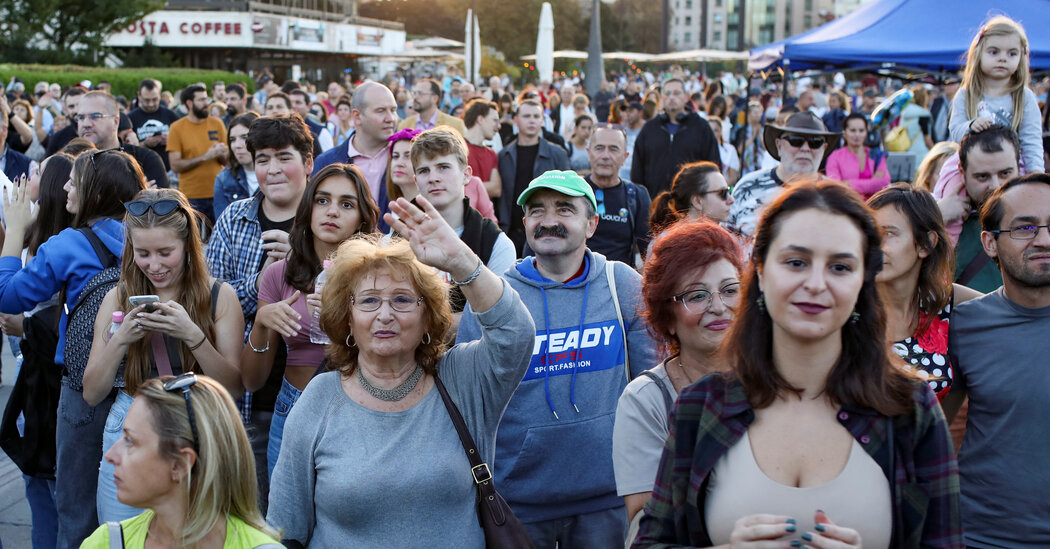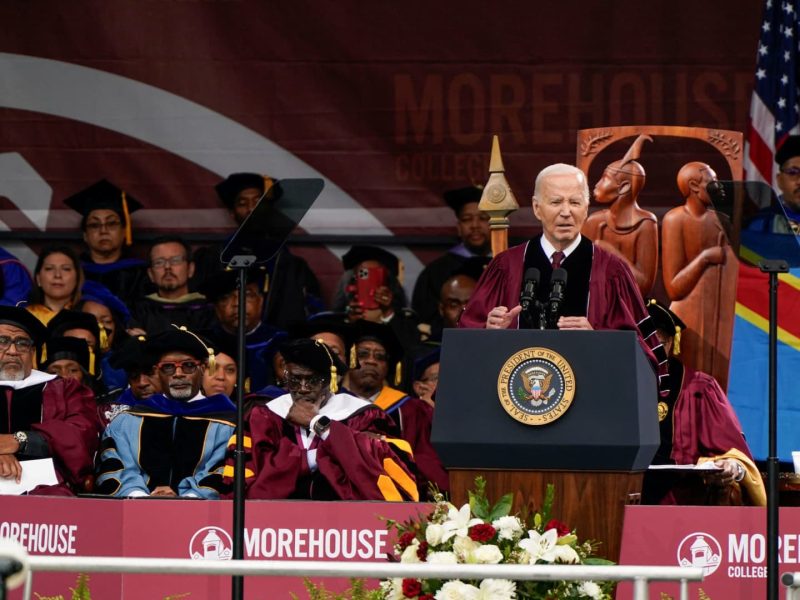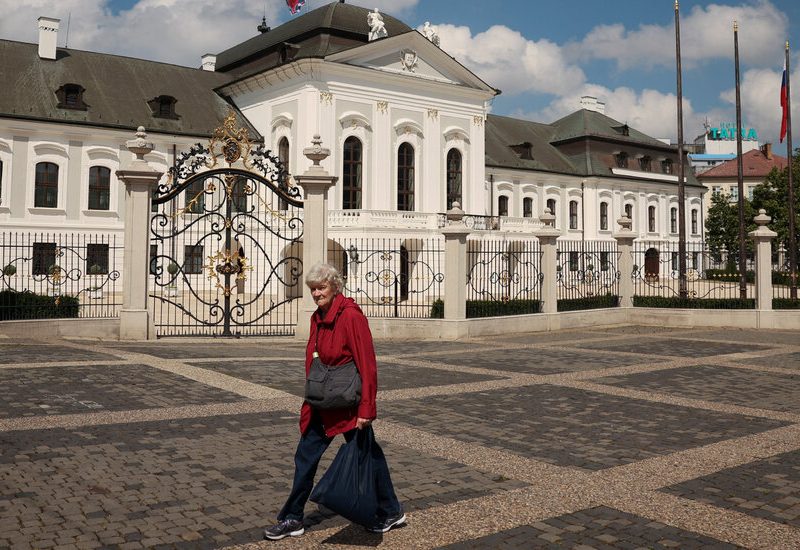For citizens of the United States, Britain, India and dozens of other countries around the world, 2024 is a big, high-stakes election year.
For Dimitar Naydenov, a Bulgarian member of Parliament and restaurant owner, it offers only yet another Groundhog Day: Bulgaria in June holds its sixth general election in three years with a vote for a new Parliament. The total number of elections in those years is even higher — eight — if those for president and European Parliament are included.
“The same thing over and over. I’m very tired,” Mr. Naydenov said, shuddering at the thought that he will soon be back doing what he does before each Election Day — pitching a campaign tent in the central square of Burgas, a port city on the Black Sea, and standing for hours each day pleading with passers-by for their votes.
“I’ve done this so many times people have started to feel pity for me,” he said.
But pity Bulgarian voters, too. They keep casting ballots only to discover that the politicians they choose cannot form a stable government. So back to the polls, they go. Again and again.
Bulgaria is part of a wider problem shared across much of Europe, particularly former communist lands to the east: deep disillusionment with politicians and even the democratic process. But, as the poorest country in the European Union and also one of its most corrupt, Bulgaria has developed an unusually acute case of democratic dysfunction and disinterest.
On the surface, little divides Bulgaria’s two main political parties in their stated ideology. With the exception of the ultranationalist Revival party, support for which has surged during three years of constant elections, all profess strong support for Bulgaria’s membership in NATO and the European Union and hostility to Russia over its full-scale invasion of Ukraine.
But they are sharply divided on how to tackle corruption, which they each blame on their rivals, and how to purge state institutions of its influence.
Voter turnout has plummeted to 40 percent in the last general election, held less than a year ago, from 83 percent in the first post-Communist vote for Parliament in 1991.
The low turnout, however, has been fairly constant throughout the recent spate of voting, suggesting that while a majority of voters see little point in elections, the public’s disillusionment has plateaued and that many have not yet given up.
“We have a highly volatile electorate looking for a savior,” said Ruzha Smilova, a professor of political science at Sofia University in the Bulgarian capital.
After the turmoil that followed the collapse of communism, Bulgarians looked to their former king, Simeon Saxe-Coburg-Gotha, who, after a half-century in exile, returned to form a political party. He was elected prime minister in 2001 on promises to transform the country in just 800 days.
He did not do that, though he did get Bulgaria into NATO in 2004. He lost electoral support and retired from politics.
“Messianic figures,” Ms. Smilova said, “usually only create disappointment and lead people to look for another savior.” Alternatively, they lead people to lose faith in the system and check out from politics.
Only 27 percent of Bulgarians, according to a survey last year by Globsec, a research group, trust their government. That was down from 35 percent in 2020 and below the 39 percent of people who trust the authorities in neighboring Romania, another often troubled former communist country.
Romania has recently seen a surge in support for a far-right party ahead of parliamentary and presidential election later this year. But its government, a shaky coalition of leftists and center-right liberals, has, unlike Bulgaria’s, managed to stagger on for four years.
The use of elections to try, so far in vain, to break Bulgaria’s political deadlock is at least a sign that the country has broken with the artificial stability of the communist era, when the same party always won and ruled unchallenged from 1946 until 1989.
But some fear that voters, fed up with constant churn, could opt for a would-be strongman leader promising an iron hand and order, as voters in Slovakia did in a September legislative election.
“I worry that after so many elections people will be ready to say: ‘Great, we finally have a strong, stable leadership,’” said Vessela Tcherneva, who was a foreign policy adviser to a short-lived Bulgarian coalition government and is now deputy director in Sofia of the European Council on Foreign Relations.
When the European Union in 2006 approved Bulgaria’s membership application, its prime minister at the time, Sergei Stanishev, declared: “This is the genuine and final fall of the Berlin Wall for Bulgaria.”
In many ways, however, the wall is still standing thanks to one of communism’s most noxious and enduring legacies — the capture of state institutions by entrenched political and business interests.
“The post communist transition is still not finished. It is not about communism as an ideology anymore but about whether institutions should be independent,” another former prime minister, Kiril Petkov, said, referring to courts, regulatory agencies, prosecutors and state companies.
Mr. Petkov, a Harvard-educated leader of a party that says it wants to break the grip of vested interests on law enforcement and the judiciary, became prime minister in 2021 for what was supposed to be a four-year term at the head of a coalition government united under the slogan “zero tolerance for corruption.” He lasted seven months.
“The system is very resilient as we have discovered over the past few years,” said Dimitar Bechev, a Bulgarian lecturer at Oxford University’s School of Global and Area Studies. “It generates corruption and clientelism so there is no critical mass for reform of the status quo,” he added.
The U.S. Treasury Department last year imposed sanctions on five current and former Bulgarian officials from across the political spectrum, including two former ministers, over “their extensive involvement in corruption,” including what it said was the bribery of judges and officials.
Announcing the unusual move to freeze the assets of influential figures in a member of the European Union, Treasury said the five men’s “diverse profiles and longstanding prominence in Bulgarian politics illustrate the extent to which corruption has become entrenched across ministries, parties and state-owned industries and demonstrate the critical need for the political will to implement rule of law reform and to fight corruption.”
An earlier round of American sanctions in 2021 targeted Delyan Peevski, a former media mogul and a leader of a Bulgarian political party that ostensibly represents the interests of the Turkish minority. Mr. Peevski, according to the U.S. Treasury, “has regularly engaged in corruption, using influence peddling and bribes to protect himself from public scrutiny and exert control over key institutions.”
A plethora of upstart populist parties promising a new start have come and gone over the years, diluting support for more mainstream forces. Attack, a party led by a far-right television presenter, briefly surged but has now been replaced on the ultranationalist flank by Revival, which, according to opinion polls, has gone from being a tiny fringe outfit in 2021 to become the country’s third most popular party.
Bulgaria’s most enduring would-be savior is Boyko Borissov, a three-time prime minister and former bodyguard who first rose to prominence as the mayor of Sofia, presenting himself as Bulgaria’s Batman — a tough, no-nonsense avenger who would rid Gotham of corruption and instability.
Instead, he struggled with a long series of corruption scandals involving himself and his close allies. One of the most embarrassing erupted in 2020 after a photograph appeared in the news media showing the prime minister asleep naked in his official residence next to a night stand with a handgun. Other photographs showed the drawer of the night stand stuffed with 500-euro notes and gold ingots.
Mr. Borissov said that he typically kept a handgun nearby but that the photographs had been doctored, dismissing them as a politically motivated smear. He said voters, not leaked images, would decide on his fate, boasting that “nobody can beat me in elections.”
He lost the next election, eventually ceding power to Mr. Petkov, a founder of “We Continue the Change,” a party that rallied voters by vowing to break corrupt ties between politicians and business and free the judiciary and other state institutions from the influence of politics and money.
But, with Mr. Petkov’s party trailing the polls, Mr. Borissov could well be back, at least for a time, when voters again go to the polls in June.
Now facing his fifth election since he left office and short of money to fund yet another campaign, Mr. Petkov in an interview said he was losing hope that the June vote would break the political deadlock and give a clear mandate for change.
“I’m exhausted,” he said.
Boryana Dzhambazova contributed reporting from Sofia, Bulgaria.



